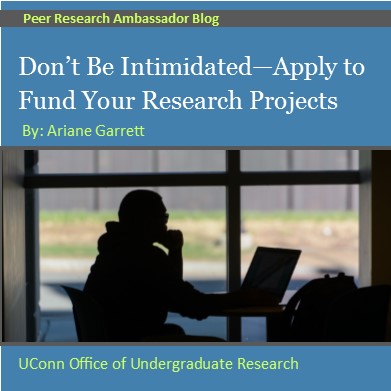By: Ariane Garrett, OUR Peer Research Ambassador
“Ariane Garrett is a STEM Scholar double majoring in Biomedical Engineering and Spanish. In her freshman year, she was named a Holster Scholar and awarded an IDEA grant for her independent research project, “An Optical System for Analysis of Implantable Medical Devices”. Ariane is continuing her research into this school year focusing on remote monitoring of implantable medical devices using radio frequency powering.”
If you’re interested in getting involved in research or competing for any sort of funding programs (such as IDEA) you’ve probably read some blurbs very similar to this. This short paragraph about my accomplishments thus far sounds pretty fancy. It paints a picture of someone who has everything together, and leaves out all of the ups and downs along the path to the funding and completion of my research project. Every stage of my project (deciding to apply, the application process, and the period after funding) came with it’s own unique set of challenges and worries. The purpose of this blog post is to address overcoming personal doubts at each stage.
Feeling Unsure If You Should Even Apply
Firstly, applying for research funding through programs like the IDEA grant is a lot of work, and it’s worth it to put some serious thought into whether or not you should apply. Do you have enough time right now to put an entire proposal together? What are your actual motivations for completing the project- is it genuine interest, or just to build your resume? After you have run through those and decided that you are interested in applying, it can often be difficult to overcome doubts about yourself or your project and follow the idea through to a proposal. The line I most often hear from my peers is, “I would never get funded anyway, so what’s the point of applying?”. In my experience, the best way to get over this particular qualm is to rephrase your goal. Don’t make winning money the end all be all of your work. Rather, your goal is to gain valuable experience by putting together a research proposal. If you get funded, great. If you don’t, you still went through the process and probably learned a lot- and you can get very valuable feedback regarding what you can improve upon. Having this mindset helps alleviate the fear of failure, because you win either way.
Feeling Unsure Throughout the Application Process
It’s important to learn as much as possible about the funding program you are applying for, and doing so often means investigating what students have done in the past. However, do not let yourself get hung up on comparing yourself to what they have accomplished. If you’re feeling intimidated by somebody’s jargon filled project title, try googling the terms you don’t understand. Soon you will be able to reword their project in terms you can understand, and you will have learned some new terminology! Also keep in mind that most funding programs care much more about the quality of your proposal than awards you may or may not have won in the past. Therefore, your energy is much better spent putting effort into your proposal and learning as much as possible about your topic of interest.
Feeling Unsure After You’ve Won the Money
Congratulations! You’ve received funding to complete your project. The feeling of pride and excitement usually only lasts for an evening or so before other feelings start to set in. Can I actually do this? Do I really deserve this money? Is my entire idea completely flawed? I remember feeling like this after I won my IDEA grant, and worrying that I would work the entire summer and accomplish none of my goals. My biggest advice if you find yourself in a similar situation is to be honest with your advisors and your peers about what’s worrying you. I went through the entire Holster Scholar proposal process under the impression that my peers had perfectly developed projects, while I struggled along behind them. It wasn’t until the very end of the application process that I finally spoke honestly with them about my doubts- and was surprised to learn that they felt the exact same way! Furthermore, it’s important to be honest with your mentor about the skills you do and don’t have. If you don’t know how to do something, always ask for help. No one is expecting you to know everything right away.
Ariane Garrett is a sophomore double majoring in biomedical engineering and Spanish. Click here to learn more about Ariane.